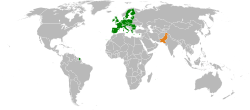Pakistan–European Union relations
 |
|
European Union |
Pakistan |
|---|---|
Pakistan–European Union relations are the international relations between the Islamic Republic of Pakistan and the common foreign policy and trade relations of the European Union.
Agreements and trade
The EU accounts for 20% of Pakistani external trade with Pakistani exports to the EU amounting to €3.4 billion, mainly textiles, medical equipment and leather products) and EU exports to Pakistan amounting to €3.8 billion (mainly mechanical and electrical equipment, and chemical and pharmaceutical products.[1]
Since 2001, EU policy is to stay constructively and strongly engaged with Pakistan and to make a significant and visible engagement, both in political and economic terms. Measures include resumption and upgrading of political dialogue, signature of a 3rd Generation Co-operation Agreement, as well as additional development assistance.
In December 2006, the Council of the EU called on Afghanistan and Pakistan to deepen relations and to cooperate closely to deal with insecurity in border areas, while urging Pakistan to build on current efforts to prevent the use of its territory by the Taliban.
In order to enhance Pakistan’s capacity on WTO related issues, a trade-related technical assistance programme was launched in 2004 with a view to streamlining procedures and processes for trade facilitation in compliance with EU norms and standards.
EU and Pakistani relations are elevated to new strategic level with the EU-Pakistani Summit that has taken in 2009.[2]
Development
Since the start of its cooperation with Pakistan in 1976, the European Commission has committed more than €500 million to projects and programmes. During the 1980s the Commission launched a mix of infrastructure and social development projects which focused on development of roads, bridges, a fishing harbour facility, rural electricity infrastructure, livestock, education, vocational training and integrated rural development. In the 1990s the Commission streamlined and consolidated its portfolio and reoriented its activities towards policy-based social sector investment programmes, placing greater emphasis on human development and environmental management in line with shifts in government policy. In addition, the Commission provided support to smaller-scale operations with NGOs in areas such as population welfare, child labour, income generation, drug demand reduction and rural health. Under the previous CSP, the EC cooperation in Pakistan focused on human development, in particular basic education programmes at provincial level.
For the period 2002-2006 €75 million were originally allocated for development and economic cooperation. Additional EC support to Pakistan was provided following the events of 2001 in recognition of Pakistan’s role as a partner in the fight against terrorism, including € 50 million for financial service reforms and to support development of micro-finance SMEs.
The 8 October 2005 earthquake had a devastating effect on Northern Areas of Pakistan, in particular Azad Jammu and Kashmir and North West Frontier Province. In response to this calamity the Commission proposed an assistance package of € 93.6 million, consisting of both humanitarian aid (€ 43.6 million) and reconstruction support (€ 50 million) for commitment in 2005. Substantial assistance was also provided under other thematic budget lines, including for Afghan refugees in Pakistan.
Under its environment cooperation policy, over the last decade the EC contributed a total of € 32 million to rehabilitation, management and conservation of natural resources, safeguarding and conservation of biodiversity, education and capacity-building through sustainable resource management with the involvement of local communities. Major target areas included upland areas of Punjab and Khyber Pakhtunkhwa (KP), benefiting more than 2 million people.
